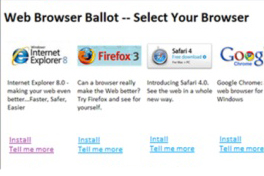Microsoft to extend browser choice to Vista, XP
Microsoft's EU-appeasing 'browser ballot' will be rolled out to Vista and XP over updates, as well as Windows 7.

Microsoft's plan to appease EU competition regulators by offering a choice of browsers will include European versions of XP and Vista, as well as Windows 7.
According to Microsoft's submission to the EU, between three and six months after its "browser ballot" proposal has been approved, the screen will be rolled out to Vista and XP users through Windows Update.
The update will be labelled either "high priority" or "important" and those users who choose to install it will be presented with a screen offering them a choice of "up to ten browsers".
This has caused confusion as the initial screen shot of the ballot screen showed only the five most popular browsers, based on market share. However, Microsoft said it is likely to start with these five and offer "further choices" in future iterations.
At the screen, users will be able to install a new browser, stick with Internet Explorer or defer the choice - with Windows offering user-defined reminders.
There will also be links explaining the differences between the browsers, and why users are being offered the choice possibly years after they bought their computer.
Windows 7 owners will be hit with the update on the 22 October, or within two weeks of the EC's decision, depending on which arrives later.
Get the ITPro daily newsletter
Sign up today and you will receive a free copy of our Future Focus 2025 report - the leading guidance on AI, cybersecurity and other IT challenges as per 700+ senior executives
It's also interesting to note that Microsoft will offer the ballot screen for five years from the date the EU approves it. This means we could be seeing it as a feature of Windows 8 also.
-
 Open source advocates "cautiously optimistic" about Cyber Resilience Act after industry pushback prompts changes
Open source advocates "cautiously optimistic" about Cyber Resilience Act after industry pushback prompts changesNews Amendments to the Cyber Resilience Act in December curtailed the potential impact on open source developers in the region, an industry body has said
By Solomon Klappholz
-
 Reprieve for open source industry as agreement reached on Cyber Resilience Act
Reprieve for open source industry as agreement reached on Cyber Resilience ActNews The Cyber Resilience Act has been maligned by open source advocates across Europe
By Ross Kelly
-
 Tiny11 review: Windows 11 with only 2GB of RAM
Tiny11 review: Windows 11 with only 2GB of RAMReview A version of Windows 11 for older machines that don't meet the full requirements
By Nik Rawlinson
-
 Red Hat Enterprise Linux becomes foundational operating system for Cohesity Data Cloud
Red Hat Enterprise Linux becomes foundational operating system for Cohesity Data CloudNews New strategic partnership between Red Hat and Cohesity aims to drive innovation in the data security and management space
By Daniel Todd
-
 Ubuntu shifts to four-week update cycle
Ubuntu shifts to four-week update cycleNews Critical fixes will also come every two weeks, mitigating the issues involved with releasing prompt patches on the old three-week cadence
By Richard Speed
-
 What's the EU's problem with open source?
What's the EU's problem with open source?Analysis The open source community has raised concerns about a raft of new regulatory changes in the EU in recent months
By Ross Kelly
-
 EU Cyber Resilience Act a ‘death knell’ for open source software, critics warn
EU Cyber Resilience Act a ‘death knell’ for open source software, critics warnNews Critics of the act claim that requirements for open source software usage could severely impact the community
By Ross Kelly
-
 AlmaLinux follows Oracle in ditching RHEL compatibility
AlmaLinux follows Oracle in ditching RHEL compatibilityNews Application binary compatibility is now the aim with 1:1 now dropped
By Richard Speed

